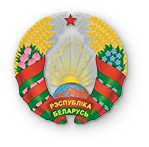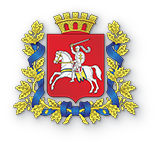Tourism
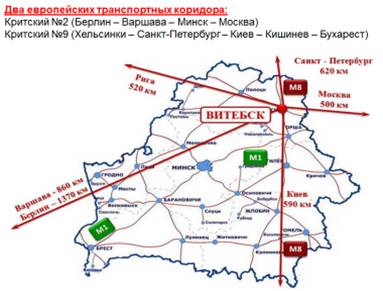 Vitebsk region lies in the north-west of Belarus, in the centre of Europe, occupying the territory of 40, 000 sq.km.
Vitebsk region lies in the north-west of Belarus, in the centre of Europe, occupying the territory of 40, 000 sq.km.
Due to its geographical position Vitebsk region has well-developed road and railway links with other countries. Thoroughfares, connecting largest economic regions of Russia to Europe, run across it. Thus, two European transportation corridors intersect the region’s territory: Berlin-Warsaw-Minsk-Moscow, connecting Germany, Poland, Belarus and Russia; and Helsinki - St. Petersburg-Kiev-Chisinau-Bucharest, linking Finland, Lithuania, Russia, Belarus, Ukraine, Moldova, Romania, Bulgaria and Greece.
These international transportation corridors include 44 national highways with thick net of roadside infrastructure, offering travellers a wide range of services. There you can refuel, have a rest, snack and sleep, and buy a variety of goods.
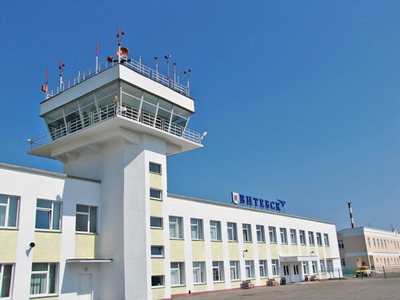
There is an International airport in Vitebsk.
The ancient Belarusian city of Vitebsk is the regional center. Another, even an older city, Polotsk, was first mentioned in chronicles back to 862, as the birthplace of Belarusian statehood, culture and spiritual life. The ancient cities of Orsha, Braslav, Postavy, Glubokoye, and others are also well-known for their fortresses, or shopping malls.
Vitebsk region possesses a great potential for tourism development, especially educational one, ecotourism, health and agroecotourism, pilgrimage and transit tourism.
The region’s centuries-old cultural and historical heritage is of a great international interest, and its ecosystems and natural landscapes are truly unique.
Cultural and educational tourism
Vitebsk region is remarkable for its 3,000 monuments, historic and cultural landmarks, relics of the past, 1,000 of which are included into the list of historical and cultural values of Belarus. Ancient settlements and barrows, time-honoured mansions and grand temples, old city centres attract visitors to Vitebsk, Polotsk, Postavy and Glubokoye.
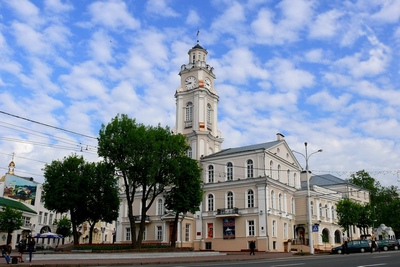 The City Hall, an architectural and historical symbol of Vitebsk, dates back to 1775 and hosts Vitebsk Regional Museum. One can admire the “bird view” panorama of an old city architectural ensemble, narrow belts of streets, old houses and street lamps, golden domes and the Dvina River; experience the most breathtaking walk around the rotunda of the City hall tower at a height of 40 meters.
The City Hall, an architectural and historical symbol of Vitebsk, dates back to 1775 and hosts Vitebsk Regional Museum. One can admire the “bird view” panorama of an old city architectural ensemble, narrow belts of streets, old houses and street lamps, golden domes and the Dvina River; experience the most breathtaking walk around the rotunda of the City hall tower at a height of 40 meters.
The Governor's Palace, built in the 19th century, is situated in the public garden opposite the Monument to the Heroes of the Patriotic War of 1812. It walls saw Napoleon 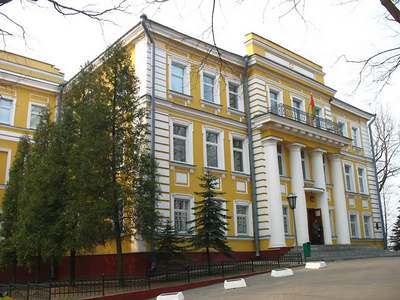 Bonaparte, waiting here for Alexander I’s envoys and making his fatal decision to advance towards Moscow.
Bonaparte, waiting here for Alexander I’s envoys and making his fatal decision to advance towards Moscow.
Vitebsk region takes pride in the world famous countrymen: Euphrosyne of Polotsk, a saint-enlightener, Francysk Skoryna, a first printer, Simeon of Polotsk, a poet - enlightener, Ivan Khrutsky, an artist, Vasil Bykov and Vladimir Korotkevich, Belarusian writers, Ivan Chersky, a famous explorer of Eastern Siberia and many others. And, of course, Mark Chagall, the world famous graphic artist and painter, who brought Vitebsk with him to St. Petersburg, New York and Paris, as Vitebsk was in his heart. Many interesting places are connected with Chagall: Art Centre of Marc Chagall with the collection of his original drawings, the art school building he taught at. No museum possesses what Vitebsk has – a house where Chagall spent his youth. Now the House-Museum greets its visitors in Pokrovskaya Street. Marc Chagall called Vitebsk a second Paris and Paris his second Vitebsk for the city’s beauty and oneness.
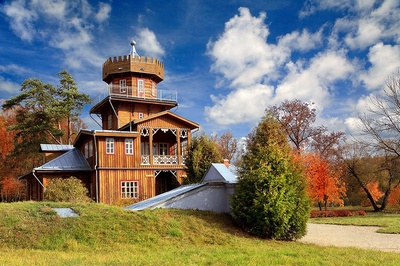 Ilya Repin, the great Russian artist, discovered a special attractiveness of Vitebsk region for himself, staying at his Zdravnevo estate. Now a museum, an unusual mansion in beautiful surroundings attracts millions of tourists from all over the world to visit and participate in the exhibitions, open air sessions, folk ceremonies and theatrical performances.
Ilya Repin, the great Russian artist, discovered a special attractiveness of Vitebsk region for himself, staying at his Zdravnevo estate. Now a museum, an unusual mansion in beautiful surroundings attracts millions of tourists from all over the world to visit and participate in the exhibitions, open air sessions, folk ceremonies and theatrical performances.
Museums and art galleries of the region own really unique collections, exhibits, virtu and rarities.
Postavy is another tourist attraction. The main site to visit is Tyzengauz Palace, a magnificent 19th century-old piece of classicism, in the shade of rare trees, an old alley, and canals. One can see a monument to Konstantin Tyzengauz, an ornithologist and scientist, one of the owners of this ancestral home which was gladly visited by Nicolai II.
An old part of Postavy is a historical monument in itself. The architectural ensemble was designed by an Italian architect Giuseppe de Sacco in the 18th century. One can still visit a well-preserved craftsman house, a doctor’s house, and an old chemistry, a palace and park ensemble on the lake bank. Other landmarks are a 19th century stone watermill and St. Anthony of Padua Cathedral.
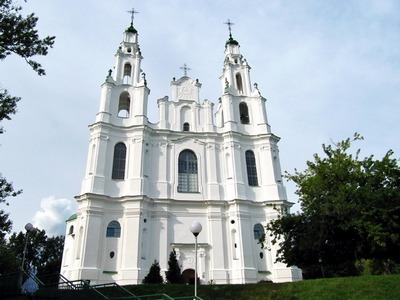 Sofia Cathedral of Polotsk, an example of the 11-18th centuries architecture, is rightly called a pearl of Belarusian building art. The oldest stone building for public worship in Byzantine style has always been admired for its beauty and grandeur. Now visitors can enjoy magnificent sounds of organ music there. Sofia of Polotsk, a symbol of cultural and historic traditions in Vitebsk region, is inscribed into the preliminary list of UNESCO World Heritage sites.
Sofia Cathedral of Polotsk, an example of the 11-18th centuries architecture, is rightly called a pearl of Belarusian building art. The oldest stone building for public worship in Byzantine style has always been admired for its beauty and grandeur. Now visitors can enjoy magnificent sounds of organ music there. Sofia of Polotsk, a symbol of cultural and historic traditions in Vitebsk region, is inscribed into the preliminary list of UNESCO World Heritage sites.
The ancient city of Orsha is also rich in historical, spiritual and architectural landmarks. They are Jesuit Collegium Complex and Kuteinsky Monastery, the centre of book printing in the 17th century. Right there, Spiridon Sobol, a Belarusian printer and enlightener published the first primer in1631. You can still see an ancient wooden church on the monastery’s territory.
Tourists and visitor tend to visit the centre of Europe. This very geographical centre was positioned in Polotsk. A commemorative monument with the inscriptions in 5 languages was set up to indicate the four corners of the earth.
Religious and pilgrimage tourism
Lying at the crossroads of Western and Eastern European cultures ,Vitebsk region has always been a specific cultural and religious place where manifold traditions blend and various national and religious confession peacefully coexist. Each confession has left a great spiritual legacy and splendid temples, churches, and cathedrals, which are truly regarded as masterpieces of religious architecture and make up the golden fund of the national culture. They number nearly 400, out of which 100 being the monuments of historical and cultural heritage. Vitebsk region can be proud of this heritage, a legacy of rural and city, ancient and renewed, wooden and stone, tiny and majestic architectural masterpieces.
The region has become a real mecca for tourists as pilgrimage and sightseeing tours are especially popular nowadays.
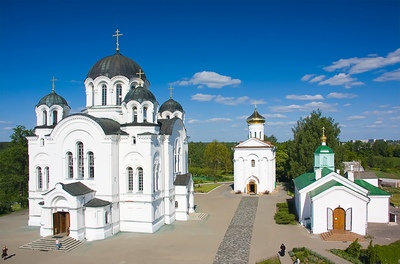 The Savior and St Euphrosyne’s Convent in Polotsk is the center of the Orthodox Church. Founded in the 12th century, it makes thousands of tourists and pilgrims from all over the world flock to the ancient monastery to venerate St. Euphrosyne’s relics and the Cross, the shrines and sacred symbol of the Belarusian spirituality revival. The Holy Transfiguration Church is the heart of the monastery complex. It was built in the mid-12th century by a Polotsk architect John on behalf of Abbess Euphrosyne of Polotsk. The church is definitely an architectural masterpiece. Its interior is decorated with unique frescoes of the 12th century. The Holy Transfiguration Church is inscribed into in the preliminary list of UNESCO World Heritage Sites.
The Savior and St Euphrosyne’s Convent in Polotsk is the center of the Orthodox Church. Founded in the 12th century, it makes thousands of tourists and pilgrims from all over the world flock to the ancient monastery to venerate St. Euphrosyne’s relics and the Cross, the shrines and sacred symbol of the Belarusian spirituality revival. The Holy Transfiguration Church is the heart of the monastery complex. It was built in the mid-12th century by a Polotsk architect John on behalf of Abbess Euphrosyne of Polotsk. The church is definitely an architectural masterpiece. Its interior is decorated with unique frescoes of the 12th century. The Holy Transfiguration Church is inscribed into in the preliminary list of UNESCO World Heritage Sites.
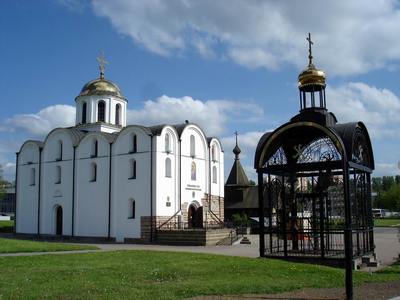 Annunciation Church in Vitebsk was built by Byzantine craftsmen in the 12th century and was the first stone church in the city. One can really sense the past touching the open fragments of an unrivalled ancient masonry, nothing like that can be found in ancient architecture.
Annunciation Church in Vitebsk was built by Byzantine craftsmen in the 12th century and was the first stone church in the city. One can really sense the past touching the open fragments of an unrivalled ancient masonry, nothing like that can be found in ancient architecture.
Vitebsk churches own their uniqueness to the Vilna Baroque style. It took more than 40 years to build The Holy Assumption Cathedral, one of the most beautiful and magnificent Orthodox churches famous for the biggest bell in Belarus. A monumental staircase descends from Uspenskaya Hill leading to the embankment and the Holy Spirit Convent.
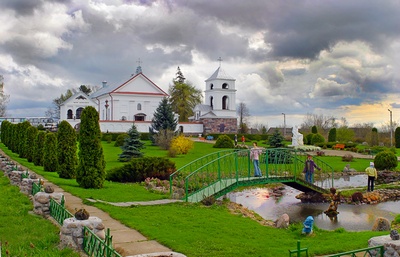 The Cathedral of the Nativity of the Blessed Virgin in Glubokoye, built in the 17th century, St. Anne’s Church and Mosar Park Ensemble in Glubokoye district, called a Belarusian Versailles, continue the list of sacred places.
The Cathedral of the Nativity of the Blessed Virgin in Glubokoye, built in the 17th century, St. Anne’s Church and Mosar Park Ensemble in Glubokoye district, called a Belarusian Versailles, continue the list of sacred places.
St. John the Baptist’ fortified castle -church in Kamai, Postavy district, shows an implementation of forms and techniques of defensive architecture, Gothic and Renaissance Styles. Being built in 1603-1606, it has never been closed, even in the Soviet period. With its 118 objects of historical value it is inscribed into in the preliminary list of UNESCO World Heritage Sites.
Health tourism
An impressive beauty and natural diversity of Vitebsk region contribute to both a comfortable rest and an effective treatment.
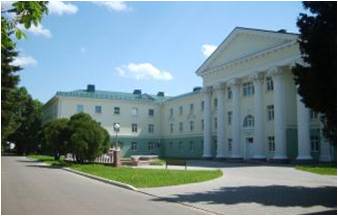 A reasonable price-quality ratio, modern technologies and highly skilled specialists of our health resorts enable them to take an advantage over the others alike. Here one can find a wide range of services for treatment and rehabilitation of respiratory, digestive, nervous and musculoskeletal systems, gynecology and urology, as well as wellness, dentistry, cosmetology and spa.
A reasonable price-quality ratio, modern technologies and highly skilled specialists of our health resorts enable them to take an advantage over the others alike. Here one can find a wide range of services for treatment and rehabilitation of respiratory, digestive, nervous and musculoskeletal systems, gynecology and urology, as well as wellness, dentistry, cosmetology and spa.
Vitebsk Region health resorts are located in ecologically clean areas, mainly in mixed and pine forests, on the banks of deep rivers and crystal-clear lakes. The very nature is a healing factor to the human body. The region’s moderate continental climate with its mild wet winters and warm summers favours rest and recovery all year round.
The complex of climatic and medical factors features dozens of mineral springs, used in treatment for various diseases. Some of them are similar to mineral water resorts Truskavets and Druskininkai, others to the ones in Alma-Ata and Georgia. Radon baths are used for spa treatment. Sapropelic muds from Belarusian deposits, as well as mineral sulphide muds of Saki Lake, are widely used for treatment and cosmetology. One can also improve health in speleo complexes, made of red and white salt blocks of Soligorsk potash mines, one of the world's leading manufacturers of potash fertilizers JSC "Belaruskali". In all these hospitals, patients take effective cure similar to the one in the salt caves with a peculiar composition of natural salt aerosol and a combination of "red" and "white" salt.
In the Vitebsk region there are more than 100 sanatorium and health resorts: 9 sanatoriums, 3 student sanatoriums, 2 health centers, 29 recreation centers and others.
The most popular health resorts are:
sanatorium Letsy of the Federation of trade unions of the Republic of Belarus,
Lepel military sanatorium of the armed forces of the Republic of Belarus,
sanatorium Borovoe of the department of Presidential affairs of the Republic of Belarus,
sanatorium Lesnye ozera of the Federation of trade unions of the Republic of Belarus ,
sanatorium Lesnoe of KGB of the Republic of Belarus
sanatorium Naftan of open joint-stock company Naftan
Children`s rehabilitation and health-improving centre Jemchujina.
Agroecotourism
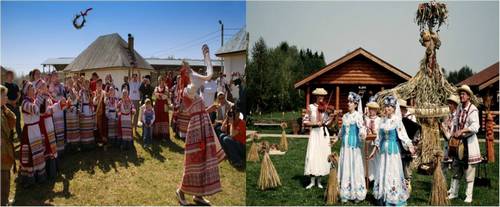 Agroecotourism, being one of the most popular kinds of tourism in Belarus, has received a significant state support. More than 600 agro-farmsteads in Vitebsk region welcome tourists from all over the world.
Agroecotourism, being one of the most popular kinds of tourism in Belarus, has received a significant state support. More than 600 agro-farmsteads in Vitebsk region welcome tourists from all over the world.
The region’s favourable geographical position, the beauty of its nature, original Belarusian folklore, festivals, rituals and traditions, national Belarusian cuisine and a warm welcome leave a long-lasting impression on the guests.
Farmstead owners organize entertainment programmes, tours and workshops on folk handicrafts. One can hear local legends and authentic songs, rehearse Belarusian dances and take part in the ancient folk celebrations, such as Kalyady, Maslenitsa and Kupalle. You can even get married in a folk Belarusian style.
In rural farmsteads they bake crispy bread, spin flax, do willow and straw weaving, mould clay pots, and make felt boots. These and many other activities await travellers as well as fresh air and wildlife, comfortable accommodation and unique atmosphere of rural life. Farmsteads are beautified with national colour and cozy atmosphere, with all the comforts necessary for good rest.
Farmsteads of Vitebsk region welcome travellers!
Ecotourism
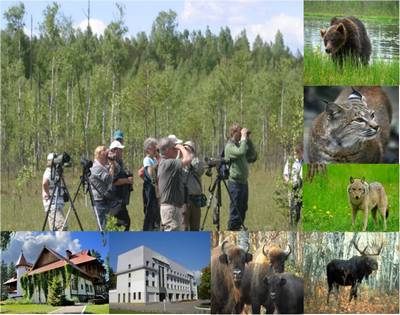 Vitebsk region is one of Europe’s greatest beauty spots, the land of blue lakes and virgin forests, transparent rivers and crystal clear springs. Numerous tourists are attracted by this beauty and nature reserves, thus making ecotourism pretty popular.
Vitebsk region is one of Europe’s greatest beauty spots, the land of blue lakes and virgin forests, transparent rivers and crystal clear springs. Numerous tourists are attracted by this beauty and nature reserves, thus making ecotourism pretty popular.
State Nature Conservation Fund of the region includes more than 300 sites, 200 natural sanctuaries, 88 sanctuaries, 2 national parks and the Berezina Biosphere Reserve.
The latter, being the oldest protected and almost intact areas in Europe, gives a chance see in the wild a Big European Five of large mammals – bear, elk, bison, wolf, lynx. It is home to a third of the Belarusian bear population.Eco routes and tourist paths embrace all the natural complexes of the reserve: forests, meadows, swamps, rivers and lakes. Visitors can both continue their environmental education in the Nature museum, and enjoy the comforts of hotels, guest houses, restaurants, bars, and banquet halls.
An unusual landscape and the beauty of picturesque lakes make Braslav Lakes National Park an amazing place in Vitebsk region. The country's largest “Braslavskaya lake group” is a habitat for rare species of forest animals, listed in the Red Book, 200 species of birds, and varieties of fish.
Annually, thousands of tourists enjoy their stay at the European class recreation centres in the National Park. "Zolovo", "Leoshki", "Drivyaty" centres are colorfully decorated in a folk style and, alongside with rest houses, recreation centers with pools, saunas, baths and a rich excursion programme, create an object of interest. Multiple archeological monuments, examples of a distinctive folk architecture, the National Park Museum lie close to water, bike and car tourist routes. Hunting entities on the territory of the National Park provide all kinds of services for fishing and hunting.
Hunting tourism
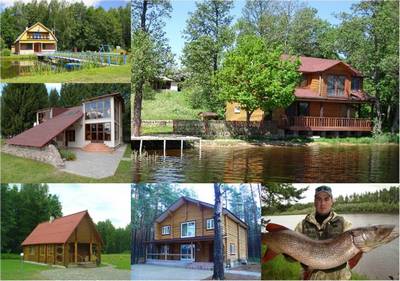 Forests being the wealth of Vitebsk region contribute to the development and popularity of hunting tourism. More than 60 hunting entities of the region, on 3.6 million hectares of hunting areas provide a full range of services from visa support, reception and accommodation of Belarusian citizens and foreign visitors, to getting a permit for the import and export of hunting smoothbore .
Forests being the wealth of Vitebsk region contribute to the development and popularity of hunting tourism. More than 60 hunting entities of the region, on 3.6 million hectares of hunting areas provide a full range of services from visa support, reception and accommodation of Belarusian citizens and foreign visitors, to getting a permit for the import and export of hunting smoothbore .
Everything favours a successful hunt (all its kinds and ways), a pleasant stay and comfortable accommodation. The main commercial species of animals are elk, wild boar, deer, and water fowl.
Our hunting entities welcome guests from Russia, Italy, Germany, France and Belgium to come and take home their hunting trophy as a souvenir.
The lakes of Vitebsk region are favourite venues for avid fishermen all year-round. Such a fish can be found only in the lakes of Vitebsk region.
Military-historical tourism
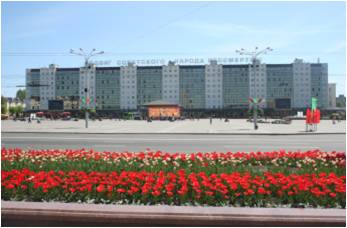 Everyone interested in military- historical tourism can visit the sites of former battle-fronts, war monuments and memorials and military museums of Vitebsk region. One of the places to visit is a memorial complex “Breakthrough” in Ushachi district. It, alongside with other war monuments, steles and obelisks, commemorates courage and eternal feats of arms of the Great Patriotic War heroes. Among such places for visiting are the Mound of Glory in Polotsk, a war memorial “For our Soviet Motherland” and a monument to Konstantin Zaslonov in Orsha, and other notable places, as any city of the region has local museums of military glory, dedicated to the guerrilla warfare, military operations, and war exhibitions, glorifying those who defended the Motherland.
Everyone interested in military- historical tourism can visit the sites of former battle-fronts, war monuments and memorials and military museums of Vitebsk region. One of the places to visit is a memorial complex “Breakthrough” in Ushachi district. It, alongside with other war monuments, steles and obelisks, commemorates courage and eternal feats of arms of the Great Patriotic War heroes. Among such places for visiting are the Mound of Glory in Polotsk, a war memorial “For our Soviet Motherland” and a monument to Konstantin Zaslonov in Orsha, and other notable places, as any city of the region has local museums of military glory, dedicated to the guerrilla warfare, military operations, and war exhibitions, glorifying those who defended the Motherland.
Victory Square is not only the largest in Belarus and one of the greatest in Eastern Europe. With its memorial complex, three 56 meter-high obelisks, the Eternal Flame, the Alley of Glory and an open-air military hardware exhibition in Pobediteley Park it symbolizes Great Victory,
Military valour has always been honoured in Vitebsk region. A monument commemorating the courage of the heroes during the Patriotic War of 1812 shows it. A granite 26 meter-high obelisk topped with a bronze double eagle on a ball, was erected on the funds raised by the residents of Vitebsk Province to mark the War’s hundred anniversary.
An ancient mansion in Chekov Street hosts a museum of Minay Shmyrev, a Hero of the Soviet Union and a legendary leader of a guerrilla detachment.
Vitebsk Region has a great number of legendary places like these. Travel agencies of the region are ready to organize tours and day trips to military sites for everyone interested in war and history.
Sport tourism
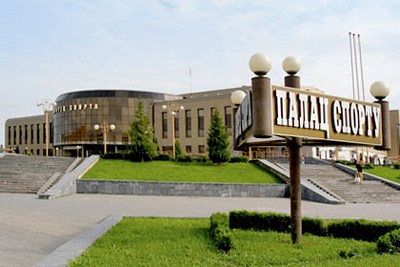 Sporting achievements and traditions of Vitebsk region contribute to the development of sport tourism. Visiting major competitions and tournaments, participation in sports and tourism activities have become a popular holiday avocation. More than four thousand sports venues (gyms, swimming pools, shooting ranges, ski resorts and other sports facilities) are available.
Sporting achievements and traditions of Vitebsk region contribute to the development of sport tourism. Visiting major competitions and tournaments, participation in sports and tourism activities have become a popular holiday avocation. More than four thousand sports venues (gyms, swimming pools, shooting ranges, ski resorts and other sports facilities) are available.
Citizens and visitors to the cities of Vitebsk, Novopolotsk, Polotsk and other cities eagerly visit sports and leisure centres. Healthy life style is one of the top priorities of the state.
Vitebsk Winter Sport Ice Arena hosts hockey matches, figure skating and short track championships, organizes public skating.
Vitebsk Central Sport Complex is the main venue for high class championships having 2 football pitches with under-soil heating and artificial grass, athletics core with modern surface and equipment.
The banks of the Vitba River are a nice place for an active relaxation, where everyone can rent a catamaran or a boat, roller skates or bikes, spend time watching international beach soccer competitions.
Polotsk Regional Centre of Olympic Reserve for Rowing welcomes guests to its training complex, with modern sports equipment and the "Parus" hotel.
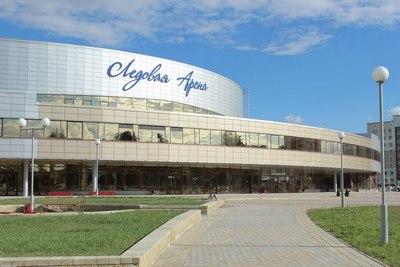 Ice Arena in Orsha ranks among the five largest sports and entertainment venues of the republic, for its both impressive size and grandeur and the choice of entertainment.
Ice Arena in Orsha ranks among the five largest sports and entertainment venues of the republic, for its both impressive size and grandeur and the choice of entertainment.
Gorodok can take pride in its new modern roller ski track, a developed infrastructure and training center for athletes, as well as the Sports City hotel, known for the conference hall and comfortable conditions for recreation and sports.
Ice arenas, sports complexes and stadiums, tourist and sports equipment rental agencies and a variety of attractions for outdoor recreation are open for visitors in cities and towns of a hospitable Vitebsk region.
Active tourism
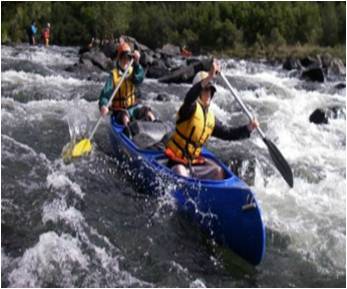 Much attention is paid to the development of active tourism in all its aspects: ecological, cultural, educational, and culinary. Many attractive routes for horse riding and hiking, cycling and rowing (boating, kayaking) run through the territory of the region, extending to the neighboring border countries: Latvia, Lithuania, Russia.
Much attention is paid to the development of active tourism in all its aspects: ecological, cultural, educational, and culinary. Many attractive routes for horse riding and hiking, cycling and rowing (boating, kayaking) run through the territory of the region, extending to the neighboring border countries: Latvia, Lithuania, Russia.
Event tourism
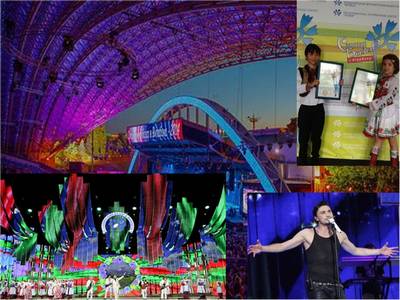 Event tourism in Vitebsk region dazzles with terrific large-scale festivities, cultural events, conferences, contests and, above all festivals. The region is the centre of international festival movement, with the International Festival of Arts “Slaviansky Bazaar in Vitebsk” being its recognizable hallmark. This great popular music event takes place every July. The geography of its participants embraces 5 continents and more than 65 countries. One can enjoy star-studded performances in various artistic genres; pop and classical music, choreography, circus, ballet, visual arts, cinema, theater, opera, folk song and dance - all at once, only during the festival “Slaviansky Bazaar in Vitebsk”
Event tourism in Vitebsk region dazzles with terrific large-scale festivities, cultural events, conferences, contests and, above all festivals. The region is the centre of international festival movement, with the International Festival of Arts “Slaviansky Bazaar in Vitebsk” being its recognizable hallmark. This great popular music event takes place every July. The geography of its participants embraces 5 continents and more than 65 countries. One can enjoy star-studded performances in various artistic genres; pop and classical music, choreography, circus, ballet, visual arts, cinema, theater, opera, folk song and dance - all at once, only during the festival “Slaviansky Bazaar in Vitebsk”
Festival life of Vitebsk region numbers about 50 different forums, events, festivals, and plein air sessions. Among them are the International Music Festival after Sollertinsky, the International Festival of Modern Choreography (IFMC), the International Organ Festival "Bells of Safiya", the International plein air session after Repin, fashion designer festival "White Amphora", festivals of sacred music, ancient and modern chamber music, medieval historical reconstruction fests, and festivals of children's creativity, and international ones of traditional culture:
“Dulcimer and Accordion are Playing” in Postavy, “Dnieper voices” in Dubrovno, “Cherry Festival” in Glubokoye, “Braslavskie Zarnitsy” in Braslav, ecological festival “Cranes and Cranberries” in Miory and many others that take place in cities and towns of the region.
Thousands of tourists and visitors come to Vitebsk region annually having about 100 hotels and recreational complexes at their disposal. Modern hotels, comfortable rooms and suites, restaurants, and parkings in Orsha, Polotsk and Vitebsk are ready to cater for every tourist’s taste, as well as hostels, motels, campings, caravan and tourist campsites. The latter, though being newly developed, give a great opportunity for tourists to have a rest and get the whole complex of road services, just staying in their mobile home.
